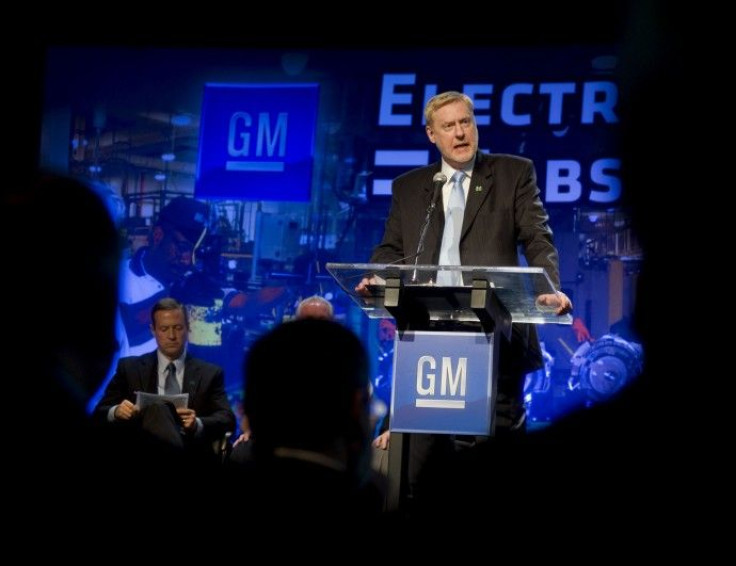GM's IPO could be the world's largest

General Motors Co is inching closer towards returning to the U.S. market in one of the biggest IPOs in the U.S. history and even become the world's largest.
Detroit-based GM, the owner of popular brands such as Buick, Cadillac, Chevrolet, has increased the size of its initial public offering (IPO) by 31 percent on strong investor demand that is likely to reduce the U.S. government stake in the troubled automaker as little as 33 percent.
The company will now sell 478 million common shares at an expected price range of $32 to $33 apiece and offer up to $4.6 billion worth of preferred shares at $50 each, according to an amended filing with U.S. Securities and Exchange Commission.
The final price of the common and preferred shares is to be announced Wednesday afternoon.
Earlier, GM had planned to sell 365 million common shares for $26 to $29 each and preferred shares worth $3 billion.
The company's underwriters have the option to buy up to 71.7 million shares, expanding the size of the offering to about 550 million shares.
At the midpoint of the expected price range and assuming underwriters exercising their over-allotment option, GM is set to raise more than $21 billion, topping the credit card company Visa's $19.7 billion IPO in 2008.
Moreover, the automaker could set history if its offering price touched $33 a share, which would see the company raising more than $22.2 billion from its initial public offering. As of now, Agricultural Bank of China's $22.1 billion debut on the Hong Kong and Shanghai markets is the world's largest IPO.
Other big IPOs include Industrial & Commercial Bank of China's $21.9 billion stock sale in 2006 and Japan's NTT Mobile Communications Network raised $18.4 billion in 1998.
Under the increased IPO size, the U.S. Treasury would see its stake reduced to as low as 33 percent from the current 61 percent. The U.S. government will now sell 412 million of its 912 million shares and raise about $13.6 billion, helping the treasury to recover some of the $50 billion taxpayer money it loaned for the automaker's bailout.
Canada ownership in GM would also fall to as low as 9.3 percent from 12 percent, while the United Auto Workers' stake would drop to 13.3 percent from 20 percent.
Meanwhile, there are still 1.5 billion shares outstanding after the IPO.
The increased IPO size from GM comes after it reported $2 billion in quarterly profit last week, marking a third straight quarterly profit, as it sold more high-margin trucks to customers.
Chinese Owners
Interestingly, the new GM owners would include Chinese state-run firms. Two Chinese banks -- Industrial and Commercial Bank of China [ICBC] and China International Capital Corp [CICC] - are underwriters of GM's IPO, marking the first time the Chinese government-owned banks taking part in a major US IPO, according to Dealogic.
This could be interesting as U.S. and China are already locking horns over undervaluation of China's currency and a trade war is likely on the cards between the two nations. On the other hand, the Chinese investment could be a positive for GM as its largest national market is China, followed by the United States, Brazil, the United Kingdom, Germany, Canada, and Russia.
Meanwhile, GM's IPO is being underwritten by several big financial institutions in the U.S., including Goldman Sachs, Morgan Stanley, Bank of America, JPMorgan and Citigroup. Deutsche Bank and two Brazilian banks are also underwriters of the biggest IPO in the U.S. history.
For GM, its problems do not end with the IPO. There are several concerns hovering around the company, including its losses in Europe, marketing strategy in North America. In addition, GM also said it expects its fourth-quarter operating profit to come in below the level of the first three quarters of the year, citing a different product mix and higher costs.
From a Blue Chip stock to Government Bailout
GM, once a blue chip stock, lost its number one automaker by sales status to Japan's Toyota. Adding to the woes, the 102-year old company was hurt by falling sales amid a sharp US recession, resulting in a government-backed bailout.
GM, which is still one of the world's largest automakers, traces its roots back to 1908. With its global headquarters in Detroit, GM employs 209,000 people and does business in more than 120 countries.
The company's shares are to resume trading on the New York Stock Exchange on Thursday. The stock is expected to trade on the New York Stock Exchange under the symbol GM and on the Toronto Stock Exchange under the symbol GMM.
© Copyright IBTimes 2024. All rights reserved.











